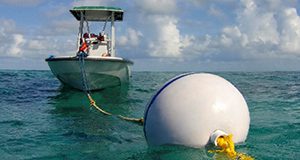Florida is often referred to as the boating capital of the nation, with more than 930,000 registered vessels. Florida’s numerous natural resources such as mangroves, seagrasses, estuaries and coral reefs are a major draw to resident and visiting boaters alike. Outdoor activities associated with boating, such as birding, fishing, swimming, snorkeling, and diving, contribute to the state’s economy. However, increased traffic on the water can bring potential risks, particularly to sensitive ocean bottom habitats such as coral reefs and seagrasses. This 4-page fact sheet written by Ana Zangroniz, Savanna Barry, and Joy Hazell and published by the UF/IFAS Florida Sea Grant College Program gives an introduction to the corals and coral reefs of Florida, provides ecological and economic information, and lists simple steps to ensure that safe boating practices reduce physical impacts on coral reefs.
http://edis.ifas.ufl.edu/sg152
Tag: Coral Reefs
SL305/SS518 The Importance and Status of Florida Coral Reefs: Questions and Answers
SL-305, a 6-page illustrated fact sheet by Cory J. Krediet, Kim Ritchie, and Max Teplitski, addresses some questions regarding coral reef biology, coral reef health, and the ecological and economic benefits coral reefs provide. Includes references. Published by the UF Department of Soil and Water Sciences, August 2009.
http://edis.ifas.ufl.edu/SS518
SGEB65/SG100 Understanding the Ecology of Artificial Reefs: No Simple Answers
SGEB65, a 4-page illustrated article by Bill Lindberg and Mark Schrope, discusses the ecological impacts of artificial reefs and implications for conservation in interview format. Published by the UF Florida Sea Grant Program, March 2010.
http://edis.ifas.ufl.edu/sg100
